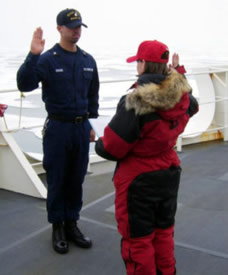
Boatswain’s Mate Steven Duque, left, swears the oath of re-enlistment as Lt. Jessica Hill, right, administers the oath.
One of two Coast Guard divers who mysteriously perished during a training dive in the Arctic last summer plunged toward the ocean floor in an uncontrolled descent, suffocated and developed lung trauma during a rapid rise to the surface, according to an autopsy report summary obtained by The Associated Press on Tuesday.
And by the time the two divers from the icebreaker Healy had been pulled up, "one diver's (air) tank was completely empty and the other diver's tank contained 90 psi (pounds per square inch)" _ the latter typically not sufficient to deliver air through the breathing regulator, the report said.
The report was provided to the AP by William Hill Jr., of St. Augustine, Fla., the father of Coast Guard Lt. Jessica Hill, who died along with Boatswain's Mate Steven Duque on Aug. 17, 500 miles north of Alaska.
The Coast Guard has released little information about the deaths but relieved the Healy's commander, citing a loss of confidence in his ability. A spokesman said the Coast Guard would not discuss the autopsy report pending the outcome of its investigations, expected next year.
Hill, 31, and Duque, 22, had slipped into a patch of open water near the ship's bow and were planning to dive to a maximum depth of 20 feet, William Hill said. A support team held ropes attached to them lest they become disoriented under the ice.
The autopsy report summary, written by Armed Forces Regional Medical Examiner Stanley D. Adams, said Hill suffered "an uncontrolled descent to a possible depth of 189 feet." Her father said that if in fact she went that deep, he didn't understand how the dive support team could have failed to prevent it.
"Why in the hell did they let out that much rope?" he asked. "It was only scheduled for 20 feet." Furthermore, he said, the amount of air in the divers' tanks would have lasted a half hour at 20 feet, but only 10 minutes at 180.
The dive support team reportedly pulled the divers to the surface after becoming concerned; attempts to resuscitate the two failed.
The autopsy ruled Hill's death an accident. The cause was asphyxia (a lack of oxygen or buildup of carbon dioxide in the body) with pulmonary barotrauma (an expansion of air in the lungs as pressure decreases during ascents) and possible air embolism (air bubbles in the blood). Duque's family could not immediately be reached to confirm whether he died of the same causes.
"It is quite likely the divers lost consciousness prior to or during the ascent," Adams wrote.
He added that his findings must be squared with investigations into the state of the divers' equipment and into the circumstances of the dive.
The autopsy summary also noted that a third diver planned to take part, but "immediately aborted the dive" for reasons that are not mentioned.
The Healy was sailing through the Arctic with about 35 scientists to collect data that would help them map the ocean floor. Hill was the ship's dive officer, as well as the liaison between the scientists and the crew.
Shortly after the tragedy, the Healy's commander, Capt. Douglas G. Russell, was relieved of duty and reassigned to administrative tasks; his superiors cited "a loss of confidence in Russell's continued ability to command." Capt. Tedric R. Lindstrom is the new commanding officer. Hill said he plans to ask an independent pathologist to review the autopsy results.
His daughter's birthday was Monday.
"Right now, I'm just waiting to get the Christmas holidays over and wait for the new year," he said. "Then I can expect the next report."
